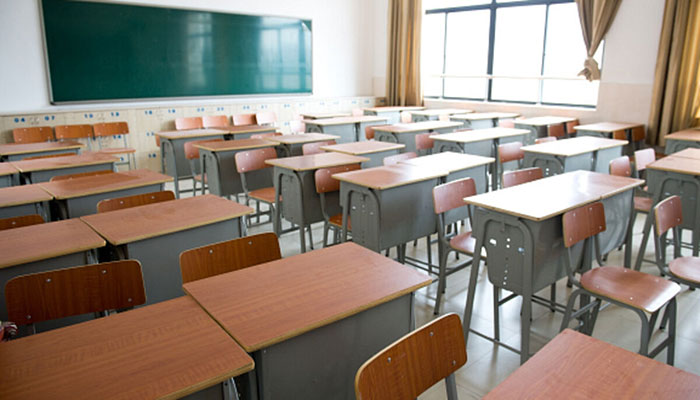Private schools refuse to implement minimum salary of Rs25,000
The Grand Alliance of Private Schools Associations Sindh — a body comprising as many as 10 private school associations of the province — has refused to implement the minimum monthly wage of Rs25,000 and 10 per cent freeship policy, under which the private schools are bound to provide free education to 10 per cent of their students.
After a meeting of the grand alliance on Friday, a press statement was issued on Saturday that stated that the private schools would also not comply with additional instructions issued by the Directorate of Inspection and Registration of Private Institutions (Dirpis) that made the renewal of registration conditional on playgrounds and proper buildings.
During the meeting of representatives of various private school associations, it was decided that the condition of providing playgrounds to students for renewal of registration could not be accepted under any circumstances. The grand alliance announced that the nominated representatives of private school associations would hold direct talks with the Sindh education minister and Dirpis director general to present their demands.
The statement read that the minimum wage for teachers would be paid under the existing law on private institutions, according to which the teacher's honorarium or salary could be four times the monthly fee of a student as educational institutions operating without external financial assistance could not be obliged to pay disproportionate salaries.
The grand alliance also stated that the private educational institutions would not accept blackmailing of government officials for the implementation of the 10 per cent freeship policy. “Private schools are already waiving up to 100 per cent tuition fees of the orphan students, children of martyrs and media workers, and of those recommended by the directorate.”
They said that there was no concept of 10 per cent freeship in any other sector. “The freeship system is an inappropriate law for self-assistance private school owners. From private universities to the corporate sector and professional colleges, the freeship law is not implemented. Then under what justification are private schools have been forced to provide 10% freeship as a social responsibility.”
Discussing the new admission policy, the private school associations said the college education department had failed to introduce a comprehensive admissions policy. They called for Sindh Education Minister Syed Sardar Ali Shah to immediately intervene and resolve the issues so that students could secure admissions to colleges.
They also asked the education minister to convene a meeting of the school education and literacy department’s steering committee as soon as possible to resolve the issues of the last quarter of the academic year. The grand alliance announced that it would hold a final meeting on Tuesday to decide its next course of action.
The meeting was attended by Muhammad Asif Khan, chairman of the Happy Palace Group of Schools; Syed Tariq Shah, chairman of the All Private Schools Management Association Sindh; Syed Shehzad Akhtar, president of the Peak Private Schools Association Sindh; Syed Danish-uz-Zaman, chairman of the Private Schools Management Association; Syed Nasir Zaidi, president of the Pakistan Academic Consortium; Jahanzeb Hussain, chairman of the Friends Private Schools Association; Engineer Munawar Hameed, chairman of the Private Schools Federation Karachi; Shehnaz Ul Huda, chairperson of the United Private Schools Association; Haider Ali, chairman of the All Sindh Private Schools and Colleges Association; and Tauseef Shah, vice chairman of the All Sindh Private Schools and Colleges Association.
-
 Nancy Guthrie Abduction: Piers Morgan Reacts To 'massive Breakthrough' In Baffling Case
Nancy Guthrie Abduction: Piers Morgan Reacts To 'massive Breakthrough' In Baffling Case -
 Adam Mosseri Set To Testify In Court Over Social Media Addiction Claims
Adam Mosseri Set To Testify In Court Over Social Media Addiction Claims -
 Will Warner Bros Finalize Deal With Paramount Or Stays Loyal With Netflix's Offer?
Will Warner Bros Finalize Deal With Paramount Or Stays Loyal With Netflix's Offer? -
 Palace Spotlights Queen Camilla For Her Work With Vision-impaired Children A Day After Andrew Statement
Palace Spotlights Queen Camilla For Her Work With Vision-impaired Children A Day After Andrew Statement -
 Kim Kardashian Still 'very Angry' At Meghan Markle, Prince Harry
Kim Kardashian Still 'very Angry' At Meghan Markle, Prince Harry -
 Texas Father Guns Down Daughter After Heated Trump Argument
Texas Father Guns Down Daughter After Heated Trump Argument -
 Andrew, Sarah Ferguson Quietly Adopts New Strategy To Control Public Narrative
Andrew, Sarah Ferguson Quietly Adopts New Strategy To Control Public Narrative -
 Harry Styles Refuses To Apologise For High Tour Ticket Prices In Rude Response: Source
Harry Styles Refuses To Apologise For High Tour Ticket Prices In Rude Response: Source -
 Ariana Grande Opens Up About ‘dark’ PTSD Experience
Ariana Grande Opens Up About ‘dark’ PTSD Experience -
 Angelina Jolie Says It Loud: 'Scars Define My Life'
Angelina Jolie Says It Loud: 'Scars Define My Life' -
 Climate-driven Wildfires Scorch Some Of World’s Oldest Trees In Patagonia
Climate-driven Wildfires Scorch Some Of World’s Oldest Trees In Patagonia -
 King Charles’ Ignorance Over Andrew & Jeffrey Epstein Not True? Foreign Office, MI6’s Work Comes Out
King Charles’ Ignorance Over Andrew & Jeffrey Epstein Not True? Foreign Office, MI6’s Work Comes Out -
 Police Detained 'innocent' Man In Nancy Guthrie's Kidnapping
Police Detained 'innocent' Man In Nancy Guthrie's Kidnapping -
 Co-founders Of Elon Musk's XAI Resigned: Here's Why
Co-founders Of Elon Musk's XAI Resigned: Here's Why -
 Dakota Johnson Reveals Smoking Habits, The Leading Cause Of Lung Cancer
Dakota Johnson Reveals Smoking Habits, The Leading Cause Of Lung Cancer -
 FAA Shuts Down El Paso Airport, Flights Suspended For 10 Days: Here’s Why
FAA Shuts Down El Paso Airport, Flights Suspended For 10 Days: Here’s Why




